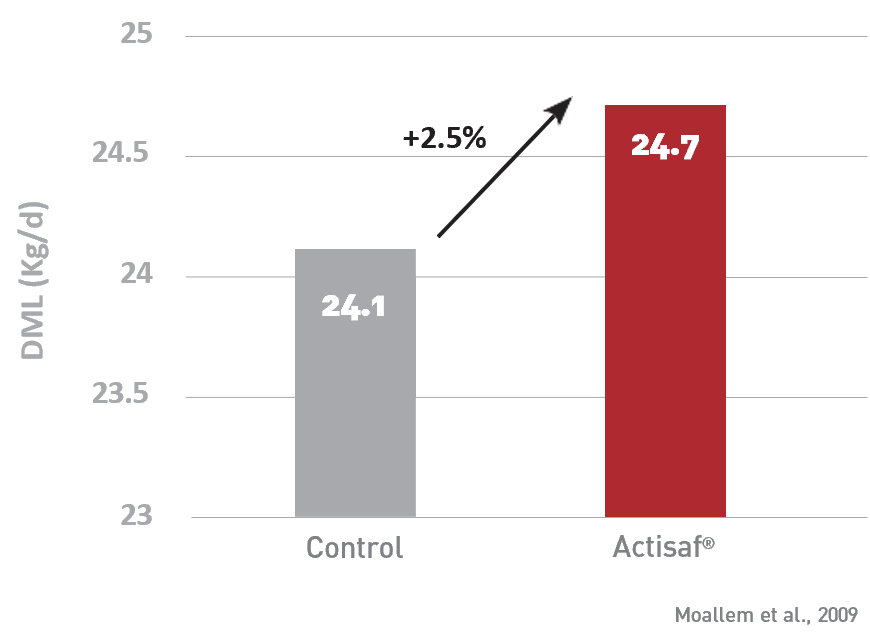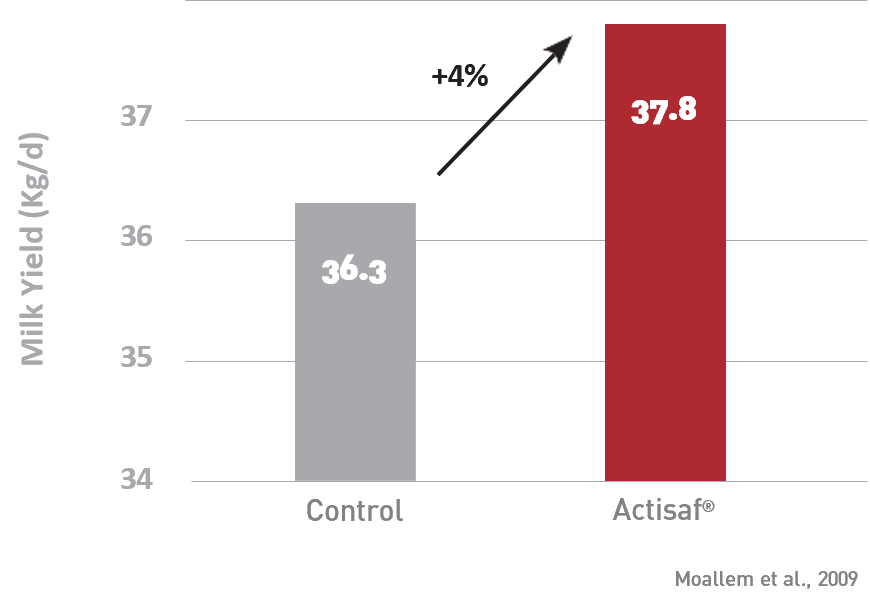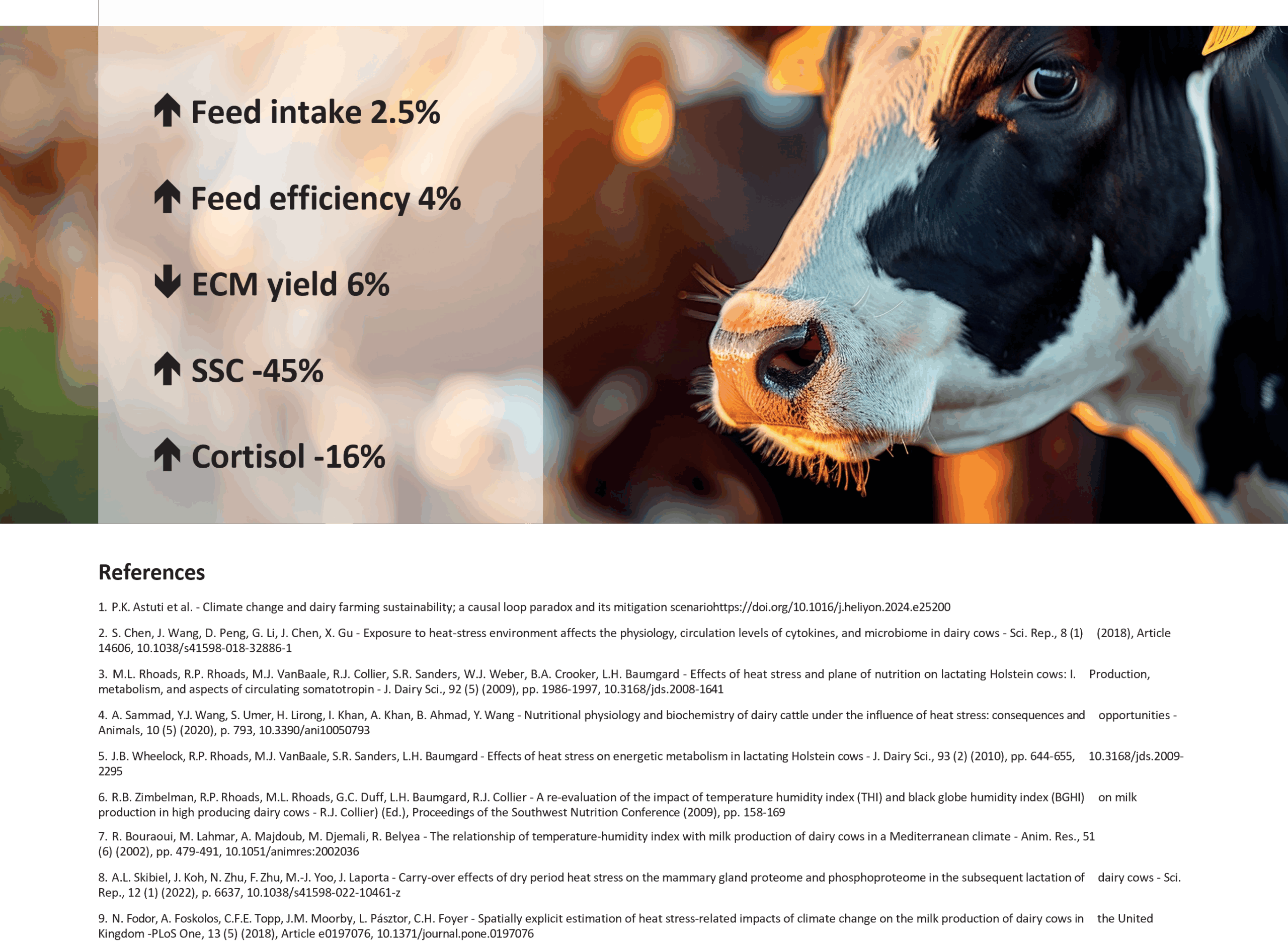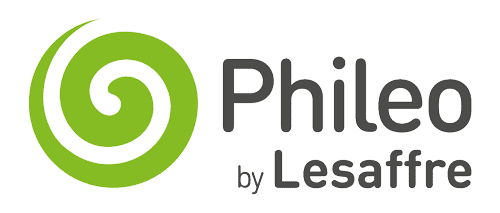22 May The effect of climate change on dairy production: Mitigating the impacts of heat stress
The long-lasting adverse physiological effects of climate change, especially thermal stress, have resulted in tremendous economic losses for the dairy industry. Animals adapt to thermal stress by implementing various mechanisms to reduce heat production and enhance heat dissipation, such as increased respiration rate, sweating, elevated core body temperature, and reduced dry matter intake[1]. These coping mechanisms alter the physiological and biochemical processes within the animal’s body, including their immunity and microbiota composition[2], which further impact their productivity.
Reduced feed intake due to heat stress is often associated with negative energy balance, body weight loss, and high non-esterified fatty acid (NEFA) levels. However, research has shown that decreased feed intake only accounts for approximately 35% of the milk production decline caused by heat stress [3-5].
In the case of the UK, the average daily temperature is expected to rise by 4°Celsius by the end of the century, causing economic losses between £2000 and £6000 per year in average years and between £6000 and £14,000 per year in extreme years for average-sized dairy farms [9].
Under heat stress, dairy cows experience significant reductions in milk yield, milk fat, protein, and energy-corrected milk yields, as well as lower fat and protein concentrations. The average milk yield can drop by 2.2 kg among Friesian Holstein cows exposed to temperature-humidity index (THI) values of 65 or higher [6], and by 21% in a Mediterranean environment when the THI value increases from 68 to 78 [7]. Heat-stressed cows during the dry period also exhibit changes in postabsorptive metabolism leading to a subsequent reduction in milk production in the subsequent lactation period [8].
The physiological mechanisms underlying the impact of heat stress on dairy cows involve alterations in energy metabolism and the disruption of the hypothalamic-pituitary-endocrine axis, which regulates key functions like stress response and lactation. These changes can impair the mammary gland’s ability to use nutrients and produce milk. Milk yield (quantity) and milk components (quality) are highly related, but milk components are more sensitive to heat stress than milk yield [9].

However, the impacts of heat stress do not stop there. The hot and humid conditions associated with heat stress can also create an environment that is more favorable for the thriving of environmental pathogens, leading to an increased risk of infections, such as mastitis, in dairy cows. Mastitis is a costly disease that can significantly impact milk production, milk quality, and animal welfare, further contributing to economic losses for dairy farmers.
In addition to the increased risk of mastitis, heat stress in the later stages of gestation can also inhibit the uterine defense mechanisms in cattle, leading to a higher incidence of metritis, a potentially life-threatening uterine infection. Metritis can cause significant health issues, reduced fertility, and even death in affected animals, adding to the economic burden on dairy operations.

To mitigate the adverse effects of heat stress, dairy producers can implement various management practices, such as providing extra shade, ventilation, cooling, and a plentiful supply of fresh, cool drinking water. Adjusting feeding times to the cooler parts of the day and spreading mealtimes over longer periods can also help maintain feed intake levels.
In addition to these management strategies, the use of yeast-based solutions has shown promising results in protecting dairy cows and calves from the worst impacts of heat stress. Trials with Actisaf® Sc 47, a yeast probiotic, have showed a 1.5 kg/day increase in milk production and a 600 g/day increase in dry matter intake for treated cows compared to control animals during moderate-to-high heat stress (77>THI>83) [Moallem et al., 2009].
The combination of Actisaf® Sc 47 and Safmannan®, a yeast postbiotic, has also delivered a enhanced immune status in dairy cows during heat stress, in contrast to the typical downgrading of immune functions under such conditions. Additionally, the successful reduction of somatic cell count (SCC) in dairy cows has been linked to the combined use of Actisaf® and Safmannan® in trials carried out on 8 Dutch dairy farms, where the SCC of supplemented cows was lowered from a pre-trial average of 280,000 per farm to below 200,000.
Selsaf®, an organic selenium-enriched yeast, has also shown promising results in mitigating the effects of heat stress. When given to dairy cows exposed to THI 72 for 9 weeks, Selsaf® delivered a significant reduction in rectal temperatures and respiratory rates, compared with cows in an inorganic selenium group (data on file – China). Selsaf® was also shown to significantly lower SCC in the treated cow group.
In conclusion, the adverse effects of climate change, particularly heat stress, have a significant impact on dairy production, leading to substantial economic losses for the industry. Implementing effective herd management practices, combined with the strategic use of yeast-based solutions like Actisaf® Sc 47, Safmannan®, and Selsaf®, can help dairy producers mitigate the challenges posed by rising temperatures and humidity, ultimately protecting the health, welfare, and productivity of their herds.

About Phileo
We daily support our partners, from global industry players to family farmers, in their transition towards sustainable good practices. With them, we develop tailor-made solutions for preventive care allowing a limited and responsible use of antibiotics by mastering microbiota and immunity. Our shared ambition is to raise healthy animals while sparing planet resources and energy. Our rich collection of proprietary probiotic strains allows us to develop evidence-based solutions taking into account animal species’ diversity ranging from pets, livestock, poultry, fish to insects to overcome the increasing complexity of food production.
Let’s act with nature for animal care
Press contact Phileo by Lesaffre: Clementine Mariën – c.marien@phileo.lesaffre.com
To learn more about Phileo, please visit www.phileo-lesaffre.com







Sorry, the comment form is closed at this time.